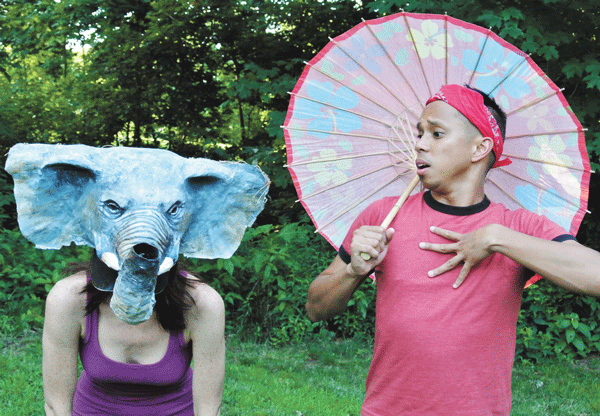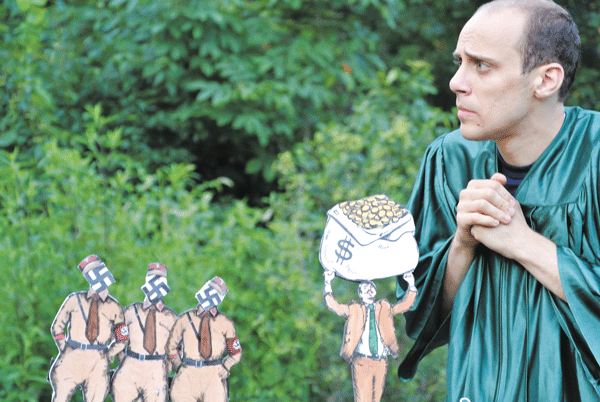
Jenny Tibbels-Jordan and Ron Dizon in “The Elephant Calf” (mask by Joe Osheroff).
Director Todoroff, on fusing physical and political theater
BY MARTIN DENTON (of nytheatre.com) | To shake up the usual outdoor theater fare offered in NYC, Elephant Run District is presenting three rarely performed short plays by Bertolt Brecht — two of which required the creation of a special contract from the publishing company Samuel French, because they had never been performed in New York City. This production will feature masks and puppets created by Joe Osheroff, winner of three New York Innovative Theatre Awards in 2012 for his choreography and movement, mask design and direction of “Homunculus: Reloaded.” Our Downtown theater columnist, Martin Denton, recently spoke with director Aimee Todoroff about the challenges of producing work in New York, and bringing Brecht to the great outdoors.
What is your job on this show? Director.
What is your show about? “Brecht in the Park” will present three rarely performed one-act plays: “The Elephant Calf” (1926), “In Search of Justice” (1938) and “The Exception and the Rule” (1929) — fusing physical and political theater, and bringing these early 20th century works into the contemporary world of the Occupy Movement, Citizens United, Stop and Frisk actions and Stand Your Ground laws.
Where were you born? Where were you raised? Where did you go to school?
I was born in Dayton, Ohio, a little city famous for many things including the Wright Brothers, Paul Laurence Dunbar and being featured in the opening lines of Kurt Vonnegut’s “Slaughterhouse-Five” in a not-so-flattering comparison to Post-War Dresden. It was there that I discovered theater. I saw my first play in high school, and didn’t see another until I auditioned for my first play at the age of 20. It was a Polish pantomime play, and there were no lines. I got the part. After Dayton, I spent a few years in Philadelphia, always considering it my “transition” city, and then I moved up to New York. In between directing, running ERD and my day job, I’m also pursuing my MFA at Southampton Arts and (with fingers crossed) will graduate in 2014.
Are audiences in New York City different from audiences in other cities/countries where you’ve performed? If so, how?
A while back, I took a road trip to see a show at a nearby regional theatre. The set was meticulously detailed and realistic, but I found it stifling — it didn’t reveal anything about the play’s inner tension or hit any deeper levels. When I said I wished it could have been articulated in a more abstract way, my companion said, “Well, this isn’t New York theatre, that wouldn’t work here.” That took me back, but it occurred to me that because New York has almost an embarrassment of riches when it comes to the variety of theatre available, the audiences here are more willing to take a chance on alternate modes of expression. However, New York audiences (in my experience) tend to try to quantify performances in a very polarizing way. A show is either good or bad. They tend to love a show, or they hate it — rarely is the discussion about what was interesting or successful within a particular play.
When visiting the Edinburgh Fringe Festival in Scotland last year (in preparation for taking “American Gun Show” this year) I kept hearing the phrase “It’s worth seeing.” Never did I hear a play dismissed outright, nor blindly praised. This simple phrasing seemed to open up the subject to discussion, and I hope this is a trend that New York audiences can adopt.
Why did you want to write/direct/produce/act in/work on this show?
I’ve always wanted to direct Brecht in a way that is accessible to as wide an audience as possible. It’s something that has been simmering in me for over a decade, and I’ve often talked about doing it in a park. When Chris found a gorgeous clearing in Central Park — a little bit off the main path but still easy to get to, wide enough for a large audience but with good sight-lines, almost completely enclosed — he took me there and showed the space to me like he was giving me a present. It was the perfect spot for Brecht.
In choosing the three one-acts to present for our first production, I specifically wanted pieces that were lesser known. The themes that are recurring in these three plays are so current, it felt like they had to be done now. The parallels to Stop and Frisk, Citizens United and Stand Your Ground Laws were so active within these plays, yet we knew we could stage them in a way that was funny, entertaining and accessible to an audience of all ages.
Which character from a Shakespeare play would like your show the best: King Lear, Puck, Rosalind or Lady Macbeth — and why?
Rosalind, absolutely. These plays have a sense of humor about them, but would appeal to her intellect and sense of fairness. Also, I think she’d dig the park setting. It would remind her of Arden.
How important is diversity to you in the theater you see/make?
The more types of theatre an artist can see, the stronger their own work will become. Every time I go to the theatre, I walk away with new ideas about what is possible or a new appreciation for a well-placed nuance. Many times, I have forced myself to go see a play that I wasn’t particularly interested in or drawn to — maybe the subject matter or style didn’t really appeal to me or I just wasn’t in the mood — and it is those shows that always surprise me the most, catch me off guard and blow me away.
This is part of why I love reviewing and think it is such an important tool for artists who are starting out and might not have the extra cash to see a show. I get to go see a play I might not have otherwise known about, much less seen, and then get to further the discussion around it. There is so much excellent work happening in our community right now, and I’m extremely grateful for every moment I have had the good fortune to experience.

Note: This Q&A originally appeared on Martin Denton’s website, nytheatre.com.
THEATER
BRECHT IN THE PARK:
THREE ONE-ACTS
BY BERTOLT BRECHT
An Elephant Run District production
Directed by Aimee Todoroff
Translation by Eric Bentley
Mask & Additional Design by Joe Osheroff
Every Sat. & and Sun. at 4pm
Through July 28 (no show July 13)
Great Hill in Central Park
(West Side, from 103rd to 107th Sts.), near the southeast corner
Additional performance at the Brecht Forum (corner of West & Bank Sts. on Tues., July 23 at 7:30 pm
Free (donations accepted)
For info, visit elephantrundistrict.org































